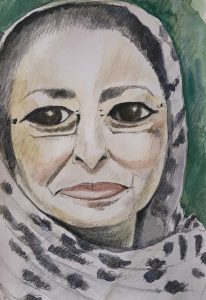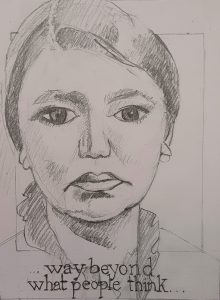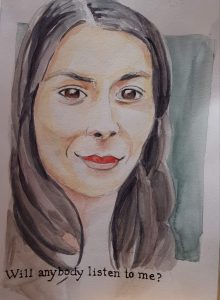
Artist Jennifer Pickering draws the portrait of Dr. Thoraya Ahmed Obaid
In her artwork, Pickering examines questions of leadership during the COVID-19 global pandemic. “Question of Leadership“, focuses on community leaders, such as Dr. Thoraya Ahmed Obaid, who speak truth to power. Because the people who deserve public attention are those leading us through this crisis with humility, sacrifice and collaboration.
About Dr. Thoraya Ahmed Obaid
Dr. Thoraya Obaid is a Saudi Arabian woman who has dedicated her life to advocating for the rights and advancement of women’s equality. She is the first Saudi, male or female, to head a United Nations agency. From 2000-2010 she was the Executive Director of the United Nations Population fund and was appointed Undersecretary General in 2001.
Gender Inequality and Covid-19
Dr. Thoraya is Chair of the Women 20 (W20), which has just released their “actionable policy recommendations” for the protection of women and girls during the covid-19 global pandemic.
The objective of the W20 is, “to ensure that the gender considerations are mainstreamed into G20 discussions and translate into the G20 Leaders’ Declaration as policies and commitments that foster gender equality and women’s economic empowerment.”(1)
In an interview with the Arab News, Dr. Thoraya raised concern about the disproportionate impact of Covid-19 on women and girls. According to experts, gender inequalities for women and girls become worse during a pandemic. Furthermore, women represent 7 out of 10 health and social care workers. As a result, they are in greater danger of being exposed to the virus. She also raises the economic importance of their service in the health care industry. For example, prior to the outbreak, women’s work in heath care represents 1.5 trillion towards the global economy.
Career
In 1963, Thoraya Obaid was the first Saudi woman to study abroad in the US on government scholarship. In 1975, she founded the first women’s development program in Western Asia. Her advocacy for women’s rights spans an entire career. Her experience includes; the League of Arab States Working Group for Formulating the Arab Strategy for Social Development (1984-5), Chief of the Social Development of the Economic and Social Commission for Western Asia (1992-93) and Population Division Deputy Executive Secretary for the same organization (1993- 1998). She started working with the United Nations on an Inter-Agency Task Force on Gender in 1996, the United Nations Inter-Agency Gender Mission to Afghanistan in 1997 and as Director of the Division for Arab States and Europe from 1998 to 2001.
About the Artist Jennifer Pickering
Jennifer Pickering is a contemporary artist from Canada, born in Switzerland and currently based in the Kingdom of Saudi Arabia. She teaches Visual Art at Advanced Learning Schools, an International Baccalaureate School. Much of her practice is based in site-specific interventions into public space. Her work explores complex systems of information exchange. Issues of access and denial, of privilege, class and where the power lies are central to her work.
For more artwork by Pickering in this series “A Question of Leadership” visit: http://jen-pickering.com/blog/
References
- https://www.w20saudiarabia.org.sa/en/About/Pages/whats.aspx
- https://en.wikipedia.org/wiki/Thoraya_Obaid (April 28, 2020)
- https://www.arabnews.com/node/1664076/saudi-arabia (April 24, 2020)

In her artwork, Pickering examines questions of leadership during the COVID-19 health crisis. “Question of Leadership“, focuses on community leaders such as Brittany Kaiser who speak truth to power. Because the people who deserve public attention are those leading us through this crisis with humility, sacrifice and collaboration.
Personal Privacy in the Era of Covid-19
New technologies are providing important tools towards controlling the spread of covid-19. For example, in many countries a tracking app can tell if you’ve been within 1.5 meters of other users. These apps are already being used in over thirteen different countries. In addition, the World Health Organization is developing their own global application.
Tracking software is being released by both governments and private corporations. However, the use of such software in democratic countries raises concern over the protection of personal privacy. On April 20th, the Globe and Mail published an article addressing this issue.(1) Their investigation focused on an Australian covid-19 tracing application. The success of the app is being credited by government for allowing them to lift lock down conditions. The article outlines concerns raised by privacy experts over the app’s centralized nature. Other issues also include overlaps with existing government surveillance laws. Yet perhaps of most concern is government failure to release the source code as promised to create transparency.
Brittany Kaiser
Brittany Kaiser is someone who can offer expertise and advice when it comes to the abuse of data and personal privacy. She is the former Director of business development for the parent company of Cambridge Analytica. The company, “offer(ed) services to businesses and political parties who want to “change audience behaviour”.(2) To this end, the company built a software program designed to “predict and influence choices at the ballot box”.(2) Thanks to whistleblowers and testimony provided by Brittany, we now know the company used illegal data in their program. Specifically, data accumulated from 87 million Facebook users.
In 2019, Brittany was appointed to the advisory board of Phunware. This company collects location and voter data to be used in the 2020 Trump campaign. According to Brittany, “it’s so abundantly clear our electoral systems are wide open to abuse. I’m very fearful about what is going to happen in the US election later this year, and I think one of the few ways of protecting ourselves is to get as much information out there as possible.” (3)
Wide Open Abuses
Why should we be concerned about using a tracing app? As Brittany warns, the current collection of data is, “wide open to abuse”.(3) This misuse of big data makes clear the lack of protections required to shield individual freedoms. Of special concern, is that this monetized practice is being used for purposes of social manipulation. As experts like Brittany warn, there is a large-scale practice, “way beyond what people think.”(3) Taking a cue from Australia, we can start by ensuring that tracking applications publish their source codes before we install them.
About the Artist Jennifer Pickering
Jennifer Pickering is a contemporary artist from Canada, born in Switzerland and currently based in the Kingdom of Saudi Arabia. She teaches Visual Art at Advanced Learning Schools, an International Baccalaureate School. Much of her practice is based in site-specific interventions into public space. Her work explores complex systems of information exchange. Issues of access and denial, of privilege, class and where the power lies are central to her work.
For more artwork by Pickering in this series “A Question of Leadership” visit: http://jen-pickering.com/blog/
References
- https://www.theguardian.com/world/2020/apr/20/privacy-concerns-persist-over-australias-coronavirus-tracing-app
- https://www.theguardian.com/news/2018/mar/18/what-is-cambridge-analytica-firm-at-centre-of-facebook-data-breach
- https://www.theguardian.com/uk-news/2020/jan/04/cambridge-analytica-data-leak-global-election-manipulation
- https://en.wikipedia.org/wiki/Brittany_Kaiser
- https://www.bbc.com/news/technology-52395886
- https://en.wikipedia.org/wiki/COVID-19_apps#Countries_with_official_contact_tracing_apps
- https://www.opendemocracy.net/en/can-europe-make-it/how-data-mining-companies-are-set-gain-covid-19-pandemic/
- https://www.washingtonpost.com/technology/2019/08/02/brittany-kaisers-work-with-cambridge-analytica-helped-elect-donald-trump-shes-hoping-world-will-forgive-her/
- https://www.theglobeandmail.com/world/article-the-privacy-issues-of-letting-big-tech-tackle-the-pandemic/
- https://www.businessinsider.com/uk-covid-19-tracking-app-2020-4

In her artwork, Pickering examines questions of leadership during the COVID-19 health crisis. As part of a larger body of artwork, “Questions of Leadership“, focuses on community leaders such as Dr. Viz, who speak truth to power. Because the people who deserve public attention are those leading us through this crisis with humility, sacrifice and collaboration.
One Woman Not Alone
On April 20th, 2020, Doctor Meenal Viz staged a one woman protest at the gates of Downing Street. One woman standing on her own, certainly not alone in her criticism of the UK governments’ handing of the COVID 19 pandemic. Specifically over failing to provide adequate protective personal equipment and testing to health care workers.
Through her actions, Dr. Viz reminds us that one individual can make a difference. For women and men like her, communities applaud loudly from their balconies every night. However, many have begun to question the narrative of war and heroism being used to describe the role of doctors, nurses, paramedics and care home workers. That is to say, a narrative which serves to support the normalization of people having to sacrifice their safety in the name of their country. Their voices silenced, a nation of health care workers demand, through the protest of one doctor, that their government listen and respond. Continue to applaud, yet do not stop at that. To be clear, this is a call to action. Because, just like Dr. Viz, we must all stand alone together, to protect those most vulnerable in our communities.
“I wanted to show the government, show the public, that this is not OK” stated Dr. Viz. (1)
Dr. Viz, herself pregnant, felt she has no choice but to take a stand. This after pregnant nurse Mary Agyeiwaa Agyapong died of COVID 19. Nurse Agyapong’s daughter survived.
About the Artist Jennifer Pickering
Jennifer Pickering is a contemporary artist from Canada, born in Switzerland and currently based in the Kingdom of Saudi Arabia. She teaches Visual Art at Advanced Learning Schools, an International Baccalaureate School. Much of her practice is based in site-specific interventions into public space. Her work explores complex systems of information exchange. Issues of access and denial, of privilege, class and where the power lies are central to her work.
For more artwork by Pickering in this series “A Question of Leadership” visit: http://jen-pickering.com/blog/